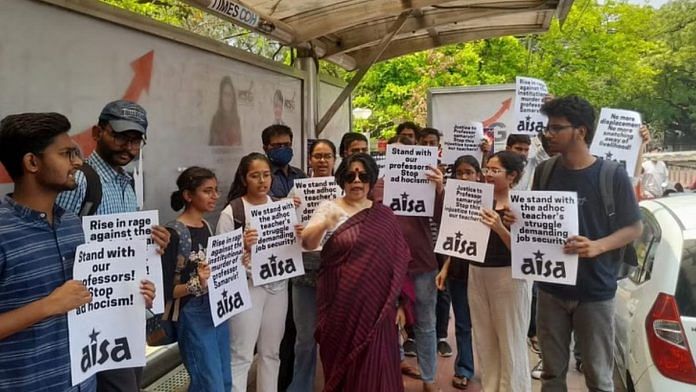In the season of academic and cultural festivities at the University of Delhi, the news of a young academic Samarveer Singh’s death by suicide at Hindu College has left the academic community in shock, scared and dumbfounded. For colleagues who knew him, the pain has been indescribable and unbearable.
Reports say the young academic was feeling depressed after being rejected in the interviews held for permanent positions in the Department of Philosophy weeks before. The staff association of the college has demanded a judicial probe into the circumstances leading to the suicide. While the probe (if it were to happen) may provide some clarity on the reasons behind such a tragic incident, the incident in itself highlights the profound pressures, anxieties, and insecurities that non-tenured academics often face during their prolonged stint at academic institutions. They are bereft of the support and advantages that are typically associated with tenured positions.
Politicisation of Indian academic institutions
It is clear that Indian higher education is under massive stress. Embedded within their respective social, political, and cultural contexts, universities and colleges are intricate and multifaceted institutions. Thus, it is difficult to attribute their unfortunate state of affairs to any singular factor. Outdated pedagogical methods, subpar quality of teaching, research, and publication, chronic financial crunch, and the decline in ethical standards, among other factors, are responsible for the current state of Indian universities.
However, it is imperative to include academic corruption as a major factor within this comprehensive narrative. The substandard state of Indian higher education could be attributed in part to the consistent violation of fundamental values of moral uprightness and academic credibility by academics in general. The politicisation of academic life, which in turn determines and regulates both administrative and academic appointments in the colleges and universities are largely responsible for this. While certain exceptions to this observation may exist, they neither prove the rule nor can a strong system be ever built on them alone.
At a fundamental structural level, Singh’s death underscores the inherent ailments that afflict recruitment procedures in Indian universities. At the University of Delhi, for example, defying principles of just meritocracy, academic and administrative appointments for long have been consistently manipulated and circumvented by political and ideological groupings within the Delhi University Teachers Association (DUTA) to augment their respective cadres. Arguably, in their times of reckoning, the Left and Congress employed their clout unsparingly to recruit their cadres and the current dispensation is merely following the conventions set by its predecessors.
As a matter of fact, it can be observed that the very practice of ad hoc appointments at the University of Delhi owes its sustenance to the tutelage and patronages provided by various political groupings within the DUTA. At times, such appointments have been made even at the cost of adopting seemingly illogical and paradoxical practices. Consider this, while most, if not all, colleges of the university score high on parameters of accreditation ranking and excellence, the majority of experts invited to appoint assistant professors in its colleges belong to institutions that can best be described as peripheral. The current practice of inviting experts from universities other than JNU and DU is aimed at replacing one ideological dominance with another. But doing so only worsens the process as most of these experts come from lowly ranked universities and colleges with negligible or little exposure to academic advancements in their respective fields.
While there has been a notable abundance of committees and commissions appointed to reform syllabi in the university, it is surprising to note that efforts towards pedagogic reforms or synchronisation of recruitment processes with best global practices have been few and far between. With the exception of a handful of bureaucratic directives that are often accompanied by pay revisions every decade—that too often hastily and thoughtlessly copied from Western universities without proper consideration of the contextual realities of Indian universities—regrettably, there has been no substantive progress in this regard. At best, such directives only end-up allowing political cadres to insidiously infiltrate the fake moulds of academic stature and credibility. A cursory examination of the proliferation of unauthenticated mysterious publications submitted as part of the current professorial promotion process at the University of Delhi is sufficient to illustrate this assertion.
Need for support mechanisms
It is highly improbable that Singh’s death would have any influence whatsoever on the appointment procedures in colleges and universities of India. This is due to the deeply ingrained “business as usual” approach that pervades our mindsets. Or else, how can one explain the fact that just a day after the tragic incident, Hindu College saw an unprecedented turnout at its annual cultural festival, Mecca. Worse, unabated and undeterred by the tragic loss of a young academic’s life and crossing all norms of sobriety and respect for the departed soul, the members of the college administration were bafflingly seen vibing on peppy Bollywood numbers.
If this is not indicative of the incessant erosion of collegiality—the most fundamental norm of academic functioning—what else could be? These pervasive insensitivities, normlessness and slackness characterising academic behaviours and systems of governance in institutions of higher learning make the need to establish peer-led support mechanisms morally and legally imperative. These mechanisms can at least facilitate recovery from pain and agonies arising from perceived failures by dismantling hierarchies and enabling individuals in similar situations to develop mutual empathy through sharing their lived experiences.
Unperturbed by the distressing situations on the ground, the ongoing recruitment processes at the university would continue and is likely to result in massive displacements. If nothing else, implementing supportive mechanisms and strategies to assist all those who may get affected in managing their potentially life-threatening episodes of depression on account of possible displacements may perhaps be a good and lasting tribute to the memory of Samarveer Singh.
Dr. Chandrachur Singh is an Associate Professor of Political Science at Hindu
College, University of Delhi. Views are personal.
(Edited by Ratan Priya)



